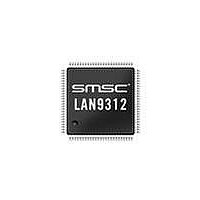LAN9312-NZW SMSC, LAN9312-NZW Datasheet - Page 70

LAN9312-NZW
Manufacturer Part Number
LAN9312-NZW
Description
Ethernet ICs Hi Per 2 Port 10/100 Ethernet Switch
Manufacturer
SMSC
Type
Two Port Managed Ethernet Switchr
Datasheet
1.LAN9312-NZW.pdf
(458 pages)
Specifications of LAN9312-NZW
Ethernet Connection Type
10 Base-T, 100 Base-TX
Minimum Operating Temperature
0 C
Mounting Style
SMD/SMT
Product
Ethernet Switches
Number Of Transceivers
1
Standard Supported
802.3, 802.3u
Data Rate
10 Mbps, 100 Mbps
Supply Voltage (max)
3.3 V
Supply Voltage (min)
0 V
Supply Current (max)
186 mA, 295 mA
Maximum Operating Temperature
+ 70 C
Package / Case
TQFP-100
Lead Free Status / RoHS Status
Lead free / RoHS Compliant
Available stocks
Company
Part Number
Manufacturer
Quantity
Price
Company:
Part Number:
LAN9312-NZW
Manufacturer:
Standard
Quantity:
143
Company:
Part Number:
LAN9312-NZW
Manufacturer:
Microchip Technology
Quantity:
10 000
- Current page: 70 of 458
- Download datasheet (5Mb)
Revision 1.7 (06-29-10)
6.4.4
6.4.5
01 - Blocking
(also used for
disabled)
Port State
Member
Port 2
VLAN Support
The switch engine supports 16 active VLANs out of a possible 4096. The VLAN table contains the 16
active VLAN entries, each consisting of the VID, the port membership, and un-tagging instructions.
On ingress, if a packet has a VLAN tag containing a valid VID (not 000h or FFFh), the VID table is
searched. If the VID is found, the VLAN is considered active and the membership and un-tag
instruction is used. If the VID is not found, the VLAN is considered foreign and the membership result
is NULL. A NULL membership will result in the packet being filtered if Enable Membership Checking
is set. A NULL membership will also result in the packet being filtered if the destination address is not
found in the ALR table (since the packet would have no destinations).
On ingress, if a packet does not have a VLAN tag or if the VLAN tag contains VID with a value of 0
(priority tag), the packet is assigned a VLAN based on the Port Default VID (PVID) and Priority. The
PVID is then used to access the above VLAN table.
The VLAN membership of the packet is used for ingress and egress checking and for VLAN broadcast
domain containment. The un-tag instructions are used at egress on ports defined as hybrid ports.
Refer to
register descriptions.
Spanning Tree Support
Hardware support for the Spanning Tree Protocol (STP) and the Rapid Spanning Tree Protocol (RSTP)
includes a per port state register as well as the override bit in the MAC Address Table entries
6.4.1.5, on page
The
modes as shown in
forwarding. Port 0 should normally be left in forwarding mode.
17
Switch Engine Port State Register (SWE_PORT_STATE)
Received packets on the port are
discarded.
Transmissions to the port are blocked.
Learning on the port is disabled.
Section 14.5.3.8, on page 375
Un-tag
Port 2
16
64) and the host CPU port special tagging
Hardware Action
Member
Port 1
15
Table
Figure 6.6 VLAN Table Entry Structure
Table 6.2 Spanning Tree States
6.2. Normally only Port 1 and Port 2 are placed into modes other than
High Performance Two Port 10/100 Managed Ethernet Switch with 32-Bit Non-PCI CPU Interface
Un-tag
Port 1
14
DATASHEET
Member
through
13
MII
70
The MAC Address Table should be programmed
with entries that the host CPU needs to receive
(e.g. the BPDU address). The static and override
bits should be set.
The host CPU should not send any packets to the
port in this state.
The host CPU should discard received packets
from this port when in the Disabled state.
Note:
Section 14.5.3.11, on page 378
Un-tag
12
MII
There is no hardware distinction between
the Blocking and Disabled states.
11
(Section 6.4.10, on page
is used to place a port into one of the
Software Action
VID
...
for detailed VLAN
75).
SMSC LAN9312
0
Datasheet
(Section
Related parts for LAN9312-NZW
Image
Part Number
Description
Manufacturer
Datasheet
Request
R

Part Number:
Description:
Ethernet ICs Hi Per 2 Port 10/100 Ethernet Switch
Manufacturer:
SMSC
Datasheet:

Part Number:
Description:
FAST ETHERNET PHYSICAL LAYER DEVICE
Manufacturer:
SMSC Corporation
Datasheet:

Part Number:
Description:
357-036-542-201 CARDEDGE 36POS DL .156 BLK LOPRO
Manufacturer:
SMSC Corporation
Datasheet:

Part Number:
Description:
357-036-542-201 CARDEDGE 36POS DL .156 BLK LOPRO
Manufacturer:
SMSC Corporation
Datasheet:

Part Number:
Description:
357-036-542-201 CARDEDGE 36POS DL .156 BLK LOPRO
Manufacturer:
SMSC Corporation
Datasheet:

Part Number:
Description:
4-PORT USB2.0 HUB CONTROLLER
Manufacturer:
SMSC Corporation
Datasheet:

Part Number:
Description:
Manufacturer:
SMSC Corporation
Datasheet:

Part Number:
Description:
Manufacturer:
SMSC Corporation
Datasheet:

Part Number:
Description:
FDC37C672ENHANCED SUPER I/O CONTROLLER WITH FAST IR
Manufacturer:
SMSC Corporation
Datasheet:

Part Number:
Description:
COM90C66LJPARCNET Controller/Transceiver with AT Interface and On-Chip RAM
Manufacturer:
SMSC Corporation
Datasheet:

Part Number:
Description:
Manufacturer:
SMSC Corporation
Datasheet:

Part Number:
Description:
Manufacturer:
SMSC Corporation
Datasheet:

Part Number:
Description:
Manufacturer:
SMSC Corporation
Datasheet:

Part Number:
Description:
Manufacturer:
SMSC Corporation
Datasheet:











